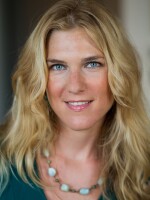Waylon Faulkner, a 12-year-old from Jersey City, N.J., is headed off to a sleepaway camp in upstate New York this summer.
"Boys and girls are completely intermingled except for sleeping," says his mother, Genevieve. "And the ages are mixed, which I think is good. It's 9 to 15."
In that kind of atmosphere, and in the throes of puberty, Genevieve knows that stuff might happen.
"Maybe he'll get his first kiss — who knows? I kinda hope so," she says. "I know he's ready. I know he wants it. He gets crushes on girls but it never goes anywhere." (Sooo embarassing.)
Summer is traditionally a time when young people have a bit more independence and a chance to explore and try new things. And there's a new generation of resources out there aimed at parents who want to make sure that teens are armed with the best possible information about their bodies, sex and relationships, so that they can make good decisions away from adult supervision.
A new book titled Girl: Love, Sex, Romance and Being You, and a separate video campaign called AMAZE, aimed at both girls and boys, are both designed to tackle topics that students don't cover in school.
AMAZE is a project of three sexual education nonprofits called Advocates for Youth, Answer, and Youth Tech Health. It first launched last fall, and now there are around 30 animated short videos available on YouTube, with about a million views total. Each tackles a different topic, from coming out as LGBT, to HIV, to dealing with BO.
The goal is to "recognize and acknowledge that sexual development is normal and healthy and people need information that's honest," says Debra Hauser, the president of Advocates for Youth. "Sex education, if it's done well and speaks to young people, can create the foundation for sexual health throughout their lives."
Genevieve Faulkner has been watching the videos with her son. "I like how each video is one topic, so we can absorb one thing at a time," she says. So far, the conversations have been "pretty one way," but she has learned from the topics Waylon chooses; for example, he was curious about girls' puberty.
Nathalie Quezada is 16, from West Palm Beach, Fla., and a volunteer with Advocates for Youth. She'll be visiting New York City this summer, and also hanging out with her friends, taking trips to the beach and bowling. "A lot of families, both parents work, and in the summer kids have more freedom," she says. And sometimes that means making tough calls on your own.
Quezada says her mom, especially, is really open with her. Her mother Ana agrees, in Spanish, that with her older daughter "no topic is taboo."
But since her parents grew up in the Dominican Republic, she says, they might not have covered everything in their own school days. Plus, there's a language barrier around things like the names of certain diseases.
Quezada says she likes the idea of the AMAZE videos because she and her peers need trusted information, which you can't always find on Google. "Broader questions, like, 'If I make out with someone will I get HIV?' most sites have accurate information," she says. "But if you have something very specific, it might not pop up."
Part of the reason groups like AMAZE are looking for ways to reach students outside of school settings is that there are gaps in official sex-ed classes. Quezada says she covered the basics of reproduction and contraception in middle school at a charter school, but some of her public school peers received abstinence-only education.
Almost half of states require that abstinence be "stressed" in sex-ed classes in public schools.
According to research by the Guttmacher Institute, which supports reproductive rights, 40 percent of young women and 45 percent of young men reported receiving no formal instruction on contraception.
And, the state of Texas, where Karen Rayne runs a sexual-education nonprofit called Unhushed, does not require sexual education to be medically accurate on topics such as condom failure rates or the causes of HIV. Texas, along with seven other states, has laws that require schools to portray homosexuality in a negative light.
Rayne's nonprofit creates comprehensive middle school curricula and trains educators in private schools and in churches, where there can be more flexibility on what is covered and how. And, she has now published a book, Girl, to try to reach her target audience head-on. The book takes on a wide range of issues, from sexual consent and decision making, to body image and healthy relationships, and porn and masturbation.
Rayne got help from a group of youthful contributors, aged 17 to 26, who sent in remarkably candid diary entries on the selected topics. "Tonight, I confessed to my pastor that I've been watching gay porn," one starts out.
Even the most open parent might have trouble with that conversation. Yet, Rayne says, "Having access to all the available information is what allows young people to make wise decisions about their own bodies."
Her book asks young people whether they will make these decisions under pressure; by following their guts; or with careful consideration. The hope is that "outside the watchful eye of adult supervision," and with access to the right information, teens this summer will make the right calls.
Copyright 2023 NPR. To see more, visit https://www.npr.org. 9(MDAzMjM2NDYzMDEyMzc1Njk5NjAxNzY3OQ001))







